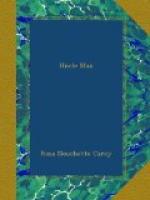The parlour really looked very nice when I had finished; the new cream-coloured curtains were up, and I had tied them back with amber silk; two or three sunny little landscapes, and Charlie’s portrait, a beautifully-painted photograph, hung on the walls; my favourite books were in their places, and the mantelpiece and the corner cupboards held some of the lovely old china that had belonged to mother. Aunt Philippa had wished me to leave it behind, as she feared it might be broken; but I liked to feast my eyes on the soft rich colours, and every piece was precious to me.
When I had disposed the furniture to the best advantage,—had placed my davenport and work-table and special chair in the bow-window, and had replaced the shabby red cloth by a handsome tapestry one,—I called Mrs. Barton to see the room.
She held up her hands in astonishment.
’Dear me, Miss Garston, it looks quite a different place. What will Nathaniel say when he sees it?—he is so fond of books and pretty things. It only wants sunshine and a bird-cage, and perhaps a geranium or two, to make it quite a bower. May I make so bold, ma’am, as to ask who that pleasant-faced young gentleman is in the oak frame?’—but I think she was sorry that she had asked the question when I told her it was my twin-brother, now in heaven.
‘That is where my husband and my dear little daughter both are,’ she said, with moist eyes, as she turned away from the picture. ’Oh, there is a deal of trouble in the world, but you are young to know it, ma’am.’ And then she looked kindly at me, and went away, to give Nathaniel his dinner.
CHAPTER VII
GILES HAMILTON, ESQ.
It was quite late in the afternoon when I put the last finishing-touches to my sitting-room, and it was already dusk when I left the cottage and walked quickly up the road that led to the vicarage.
My busy day had not tired me, and I should have enjoyed a solitary ramble in spite of the wet roads and dark November sky, only I knew Uncle Max would be waiting for me. A keen sense of independence, of liberty, of congenial work in prospective, seemed to tingle in my veins, as though new life were coursing through them. I was no longer trammelled by the constant efforts to move in other people’s grooves. I was free to think my own thought and lead my own life without reproof or hindrance.
The vicarage was a red, irregular house, shut off from the road by a low wall, with a court-yard planted somewhat thickly with shrubs: the living-rooms were chiefly at the back of the house, and their windows looked out on a pleasant garden: a glass door in the hall opened on a broad gravel terrace bordered by standard rose-trees, and beyond lay a smooth green lawn almost as level as a bowling-green; a laurel hedge divided it from an extensive kitchen-garden, to which Uncle Max and Mr. Tudor devoted a great deal of their spare time and superfluous energies.




